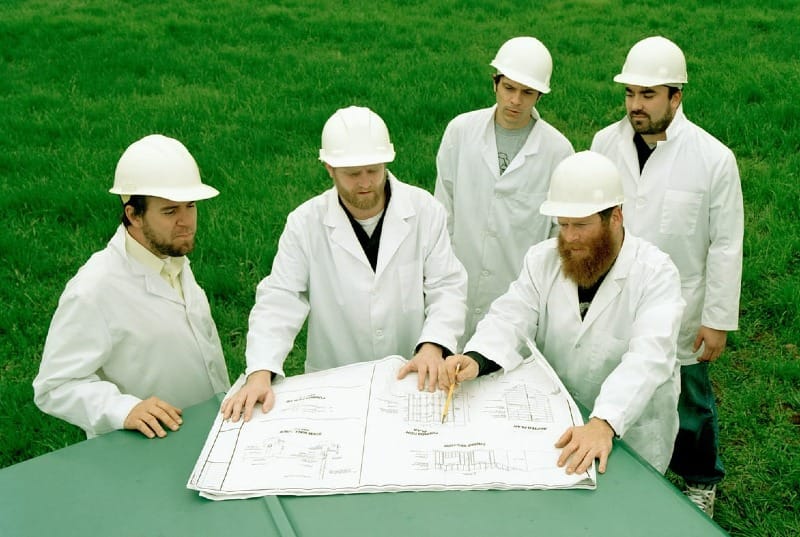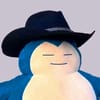Let’s Put This Pinto on the Moon
Grandaddy logs back on

Grandaddy @ Marquee Theatre
Tempe, Arizona
March 10, 2004
I’m convinced that in the span of a few distracted college semesters or some similar phase of young adult dereliction, anyone who plays or attends small-time shows with some degree of conviction—or even just aimlessly pals around with those that do—has a decent shot at catching a rising star. I’ve seen plenty of acts at the beginning (or thereabouts) of what would prove to be resilient music careers, even a couple early glimpses at verifiable greatness. Flashing these shows like rare Pokemon cards on the playground of clout, however, should be taken with the caveat that my presence in the right room on the right night was most often attributable to dumb luck or other people’s doing.
Such was the case when I happened to see The Killers in a dingy, soon-to-close Phoenix club six weeks before Hot Fuss dropped because they were supporting the totally forgettable dance-rock band my friend and I had intended to see. The evidence was there, but only in retrospect did we piece together the band’s massive potential. I can’t confirm if they played “Mr. Brightside”, but I distinctly remember Brandon Flowers flogging “Somebody Told Me” with self-effacing charm: “This is supposed to be our big single. Not very many people have heard it, but now 25 more people are gonna hear it!” This panache was already primed for arena deployment: Flowers worked up a tidy sweat in a tailored suit jacket, a never-not-grinning Ronnie Vanucci could barely keep his ass planted on his drum throne. I was too early in my show-goings to confidently bet on their longevity; I was only certain that this band of Mormon dandies had irresistible songs about liking indie rock and feeling inadequate. Their bright future and handsome mugs would look me in the face from the cover of Spin a few months later.
Completely unmistakable, however, was the talent of Lindsay Jordan, then 16 years old, performing solo in the living room of a third-floor walk-up in Georgetown shortly before Matador Records inked a deal for Snail Mail’s debut album. I was struck first by her lyrics, full of observant and potent images of romantic yearning. But her voice, her awareness of its dynamic capabilities, and how well she controlled it for maximum depth of feeling, was staggering for a performer of any age. By her third song I knew I was seeing something extraordinary, convinced this master stenographer of the teenage heart was going to blow the fuck up.
Before I overstate any Svengali-like intuition, I should note this D.C. show was a stop on the same DIY tour where my bandmates and I played a gig in a tiny student rec room on the Bard campus with Japanese Breakfast, whom I thought were fine. Same for the bucktoothed Canadian goofball I was assigned to cover at a nearly empty all-ages gallery in 2012, though I think no one is more surprised at his ascent than Mac Demarco himself. With these and other whiffs, it’s clear I’m far too wedded to my own temperamental, sometimes miserly taste to have any prophetic or lucrative insight into the music other people might enjoy or buy in droves.
More of interest, and certainly more rare, was the one time I witnessed this phenomenon in reverse, seeing an established and seemingly popular quantity tumble back to earth. In 2004, I went to see the tender fuzz-rock band Grandaddy, who were riding high on the reception of their third album, Sumday. Their most clever and affecting batch of tales from the perspective of lonesome robots and sales team supervisors, the record had gotten them pegged as the Miller-swilling Radiohead of the Central Valley, and I had assumed they were flooring a suped-up El Camino toward major renown.
The show was at a 1500-capacity theater in Tempe, Arizona, and a mass of people likely just shy of that figure had occupied the building. Problem was, by the time Grandaddy took the stage, only a tiny slice of the horde remained. There was no fire alarm or UFO sighting—nearly the entire crowd just up and bailed on them.
Any sore feelings the band might’ve had about the sudden vacancy were well-concealed: they went about their gentle way, Christmas lights draped on their amps, sporting big beards and thrift store trucker hats with kitten prints. I was hardly witnessing a star crash from the heavens–I even have reason to suspect this wasn’t the first time they had to endure an early crowd exodus–but soon enough, this band of ELO-loving skate rats was going to implode.
For some reason, they were on tour with New Jersey emo band Saves the Day. Alternative rock radio was not keyed into either band’s respective niches, but both were getting consistent airplay on MTV2 and plenty of print coverage. From the standpoint of a replacement-level booking agent, one who probably came of age when idiosyncratic guitar music of any type was filed under “college rock”, a package like this surely didn’t feel like a stretch.
Those on the ground, however, could easily sniff out the incongruity. Saves the Day were labelmates with Dashboard Confessional. Grandaddy was more in cahoots with woolly record store clerk faves like Earlimart and Super Furry Animals. Two very different lunch tables, for lack of better term. Apparently the two bands had been trading off headlining duties, and on this night Saves the Day was in the penultimate slot. Singer Chris Connely was a winsome Rivers Cuomo-like crooner with just a touch of Morrissey fatalism, his sweep of blonde hair swaying just above his striped polo, his insights into the teenage heart matched by the voices of several hundred teenagers.
I liked both of these bands and maybe suspected it was a strange match, but I was mostly in indiscriminate thrall to whatever sensitive or sense-obliterating jams I could get my hands on. I was shy and sheltered and from a tiny rural town, trying to navigate my first year of suburban public high school. And back then, due to what I suppose was the novel thrill of finally being surrounded by seemingly like-minded rockers, I often summoned the completely uncharacteristic nerve to chop it up with strangers at shows. I’m sure I was in some way pestering the girl with thin black gauges standing in front of me, but she readily volunteered how much she loved Saves the Day, how many other bands of their ilk she’d seen and gotten to chill with, and how confident she was that a similar hang was likely in store for her and her friends that night. She had never heard of Grandaddy. I struggled to find the best way to sell them.
As much as Elliott Smith and the Saddle Creek contingent may have successfully bridged the emo-indie divide, Grandaddy’s kitschy brand of office park malaise wasn’t going to connect with vast swaths of teens. I was fascinated by the paranoia of OK Computer and the sentimental futurism of The Flaming Lips, but to be fair, my cohort and I were only just becoming enthralled with the promise of tech and was in no position to truly question its motives. I liked Grandaddy’s modest provenance, that Lytle found understated beauty and dreariness in the banal, but it was nothing that would ever congeal into a beautiful scream or lovesick wail. That sort of catharsis was a far more bankable enterprise, as evidenced by how many Saves the Day t-shirts I’d spotted in the school cafeteria. Nearly everyone in the theater was there for them. And so the place began to clear out when they'd finished.
I plead with my new acquaintance one last time to stick around. “Probably not,” she said, probably annoyed. It seemed her friends, who had never materialized in person but were sending her text messages, were on the move.
Standing at the barricade as Grandaddy played their finale, the kaleidoscopic “The Final Push to the Sum”, I understood I'd be taking a seat with the tinkerers, gearheads and meta-game min/maxers, and took comfort in its sum of pride and defeat. I was endeared even further when the band finally addressed the crowd at length during a tuning break, with Lytle mentioning the afternoon had afforded the band some time for a session at a local skate park. That summer I would finally succeed in dropping into a mini-ramp, but I’d also catastrophically fail to scale a funbox and open up my knee. I wasn’t cut out for heshing, and I never thought such a modest endeavor could hurt so much.
Same for Grandaddy. The tribulations that dogged them—burnout, drugs, the costlier-than-expected overhead for a secondary act on a major label imprint—were detailed in an excellent 2006 Magnet profile published in advance of Just Like the Fambly Cat, the follow-up to Sumday that Lytle and Co. never toured and which he effectively treated as a swan song. Though reluctant at first, the band regrouped in 2012 for a successful series of shows. In 2017, plans to tour for the reunion album Last Place were scrapped due to the tragic passing of original bassist Kevin Garcia.
Today, when Pokemon now hover in the purview of AR goggles, cheap credit obscures the plain duplicity of an open plan office swindle called WeWork, and computers respond to prompts with a misplaced assurance we too-readily accept is just like our own, there is plenty of reason to sigh like the homesick robots in a Grandaddy song. Even “enshittification” sounds like a stray lark Lytle might've committed to a legal pad.
But listening to Blu Wav, the unhurried, country-tinged new Grandaddy record released last week, it feels like all the attention I paid to his technophilia did Lytle a disservice. There was a time when he had a gas with his vintage synths and vast lyrical inventory of obsolete gizmos, but he’s never not been a guy primarily concerned with timeless matters of the lonely heart. His consistent and keen affinity for nature always got relegated to second mention too. On “East Yosemite”, he sings of carving his name and that of a former love in a tree, a waterfall overpowering any other noise, his phone well out of service range. If not under uncut starlight, it’s the kind of thing best heard in an uncrowded room.

